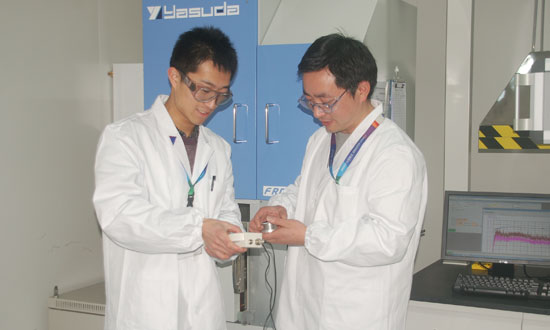 |
|
|
|
|||||||||
Royal DSM's Sijbesma unveils his vision for a biochemical world
Feike Sijbesma, 51, may be relatively young for his job as chief executive officer and chairman of Royal DSM NV but, since taking the helm of the Dutch specialty chemical company five years ago, he has always borne future generations in mind.
"In two to three centuries from now, people will look back on our civilization as merely a brief moment in history, when we shifted our total economy to coal, oil and gas. To make the shift back to living with the land we need to start this shift now."
   |
|
Royal DSM NV's research lab in Shanghai. The Dutch specialty chemical company registered sales of $2 billion in China in 2011 and is heavily investing in life sciences. [Photo/China Daily] |
That was among the many statements the Dutchman made at board meetings, as the winner of the United Nations Humanitarian Award and as the chair of the chemical industry session at the World Economic Forum.
With an education background in chemical sciences and business administration, he seems to be perfectly positioned to make such pronouncements. "We need more passion and responsibility in an area so important to people and the planet," he said.
Sijbesma has just celebrated his 25-year anniversary working for DSM, where he has witnessed tremendous changes.
One is the changing role of enterprises. "Years ago, you may have had companies that exerted an impact locally but few with global influences. Today, we see companies that have credits on bank accounts in several countries. That means these companies can do good for human beings or, equally, can create disasters."
So, despite popular concerns that the chemical industry is to blame for the many environmental problems, Sijbesma argues it is in fact a substantial part of the solution.
The annual Davos Forum in Switzerland witnessed his efforts in encouraging fellow companies to advocate this thinking and leading discussions on how chemicals can improve the state of the world.
"The saving of greenhouse emissions in end-products, for example at the level of customers and final users, are two to three times higher than during the production and transportation processes. On top of this, the industry will move toward more renewable inputs, making it 'greener',"he said.
To this end, the company designs products that make solar cells more efficient by reducing the extent of reflection, that increases the blade sizes of windmills to generate more energy, that make cars lighter which then consume less fuel and emit less carbon dioxide.
The other change, Sijbesma said, is the evolving tide of manufacturing. Since the industrial revolution, coal, oil and gas have remained the only three materials for producing artificial goods.
But in the subjects of resource sustainability, climate change, as well as an anticipated surge in oil prices, "the so-called fossil age will make a shift to a bio-based economy", he said.
"We are reaching the peak of the fossil and oil age, so now the curve is heading toward the other end. The fossil age may still have 150 years to go but we cannot wait until the last moment to switch," he warned.
Change is deeply embedded in the genes of the Dutch company. It was originally a coal-mining firm, then became a chemical company that rode the boom of mass construction in the 1970s. DSM always responded to key global societal trends that affect markets and people in different ways.
Biotechnology of the future, in the eyes of Sijbesma, can potentially allow people to produce human food from plant-materials by extracting nutritional high quality edible proteins, as well as bio-materials, bio-chemicals and bio-energy.
So Sijbesma has been the driving force behind DSM's push into life sciences and materials sciences. Under his guidance in 2007 the company divested more than half of its businesses in petrochemicals and specialized areas while boosting the life sciences element of its portfolio threefold to 40 percent of total sales and raising its sales in nutrition 10-fold so far.
These include new fields such as nutrition vitamins, minerals addressing malnutrition and resins for coating surgical instruments.
"If you don't adapt, you won't survive," he said in a nod to Charles Darwin's theory of evolution.